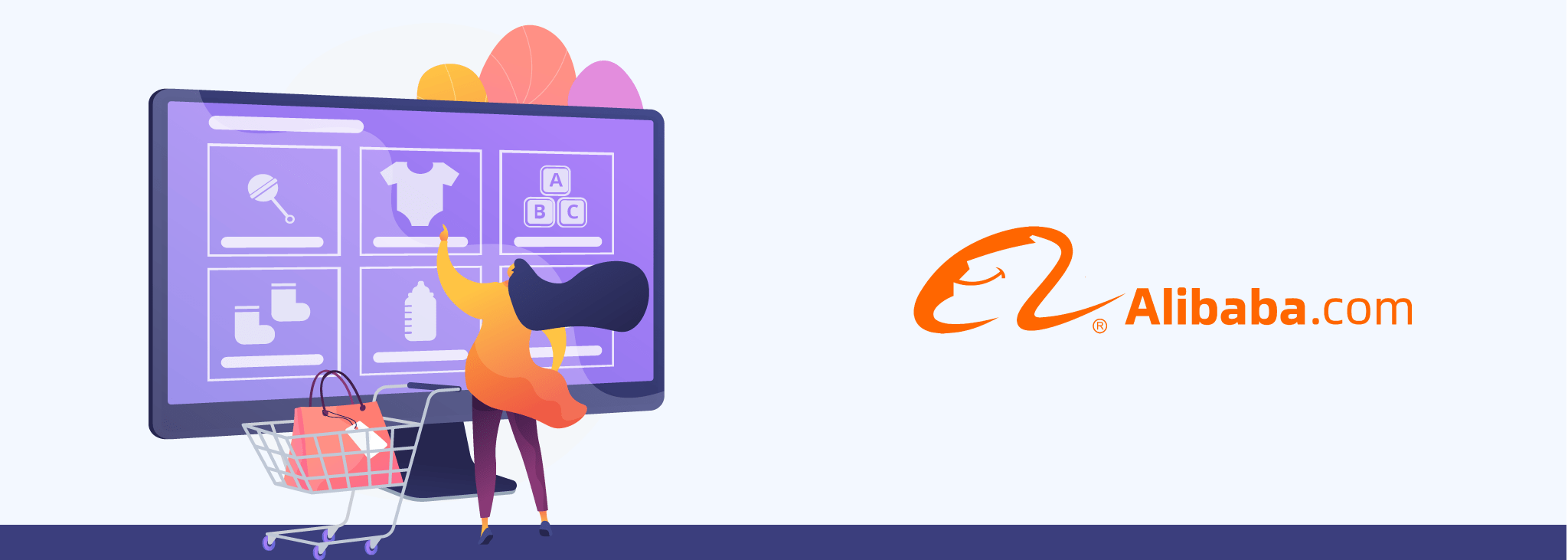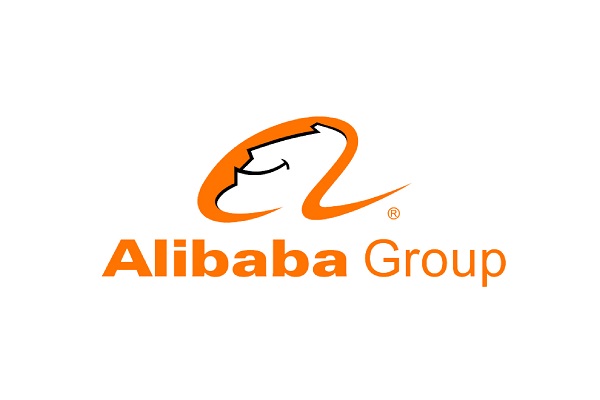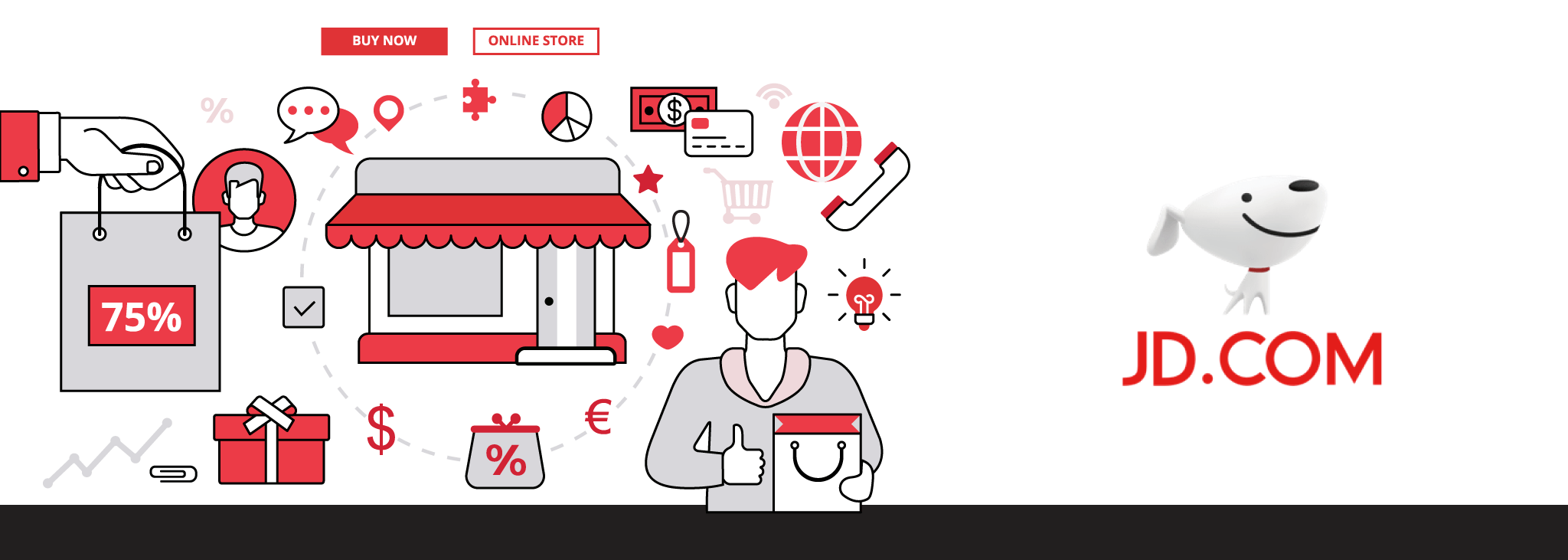• Taobao (China’s leading e-commerce platform)
• Tmall (e-commerce platform for consumers in and outside of China)
• Freshippo (chain of self-service stores)
• AliExpress (the largest e-commerce marketplace)
• Lazada (Southeast Asian e-commerce platform)
• Alibaba.com (wholesale site)
• 1688 (China’s leading wholesale platform)
• Ele.me (on-demand delivery platform for food, takeaway, flowers, and pharmaceuticals)
• YouKu (China’s leading video platform)
• DingTalk (digital workspace)
• Alimama (monetisation platform)
• Alibaba Cloud (cloud services)
• Cainiao (Smart Logistics Network)
Introduction
Alibaba Statistics: Alibaba is a Chinese multinational technology firm that engages in e-commerce, retail, and cloud computing services. It is primarily recognised for its online marketplaces, which facilitate connections between buyers and sellers via platforms such as Alibaba.com (B2B wholesale), Tmall and Taobao (B2C and C2C retail), and AliExpress (global B2C). Alibaba functions as a holding company with a varied portfolio that encompasses digital media, logistics, and local services.
Alibaba Group Holding Limited is incorporated in the Cayman Islands, established on June 28, 1999, in accordance with the Companies Law of the Cayman Islands. The company originated as a modest enterprise with the vision that the Internet could assist small businesses in expanding and competing on both local and global scales. Currently, Alibaba stands as the largest online shopping platform and boasts numerous subsidiaries worldwide.
Its primary operations include online shopping, cloud computing, digital media, entertainment, and innovation initiatives. Moreover, Ant Financial, an affiliated entity, offers payment and financial services to both consumers and businesses. Alibaba has developed a digital economy that links consumers, sellers, brands, retailers, service providers, and business partners. In this article, we will provide further insights into Alibaba Statistics.
Editor’s Choice
- Alibaba was founded on June 28, 1999, in Hangzhou, Zhejiang.
- Alibaba Statistics also indicate that online shopping in China is projected to reach $3.6 trillion by 2025.
- In the initial quarter of 2022, Alibaba is projected to have 1.28 billion active consumers globally.
- In 2023, 46% of Alibaba’s overall revenue was derived from its retail business in China, establishing it as the primary source of income for the organisation.
- During the Singles’ Day sales in 2021, the gross merchandise volume across Alibaba’s platforms exceeded US$84.5 billion.
- As of the end of March 2025, Alibaba Group Holding Limited, the largest e-commerce company in China, had a workforce of 124,320 full-time employees.
- 12% of the traffic to Alibaba’s website from desktop users originates in the United States.
Historical Facts
- Alibaba was founded on June 28, 1999, in Hangzhou, Zhejiang.
- In October 1999, Alibaba secured a US$25 million deal from the Swedish Wallenberg family’s Investor AB, along with funding from SoftBank and Goldman Sachs.
- In 2005, Yahoo! invested in Alibaba via a variable interest entity (VIE) structure, acquiring a 40% share in the company for US$1 billion.
- On September 19, 2014, Alibaba made its initial appearance on the New York Stock Exchange (NYSE), raising $25 billion in its initial public offering (IPO), which at that time was the largest IPO ever, with a market valuation of $231 billion.
- Starting in mid-2015, Alibaba initiated investments in Paytm, a mobile payment service based in India.
- In early 2017, Alibaba and Shen Guojun, the founder of Intime, reached a consensus to pay up to HK$19.8 billion (US$2.6 billion) to privatise the retail chain.
- In January 2018, Alibaba became the second Asian firm to achieve a valuation exceeding $500 billion, following Tencent. As of 2022, Alibaba is positioned 9th in global brand value.
- In 2020, it was acknowledged as the fifth-largest artificial intelligence enterprise.
General Alibaba Statistics and Facts
- Alibaba aims to achieve a total sales figure of $1.4 trillion in gross merchandise volume (GMV) by the year 2024. For context, in 2015, Alibaba’s sales amounted to merely 76 billion yuan.
- Now, just 9 years later, the company is targeting 1 billion active users alongside the $1.4 trillion GMV. This objective is a component of their five-year growth strategy.
- As part of this five-year initiative, Alibaba intends to secure 1 billion active customers by 2024. The company’s GMV is experiencing rapid growth, and if current trends persist, Alibaba is poised for even greater expansion.
- According to Alibaba Statistics, the Alibaba platform features 5,900 distinct product categories and approximately 2.8 million storefronts. This extensive variety contributes to Alibaba’s success both domestically in China and on a global scale.
- The platform serves as a “one-stop shop” for nearly any product you may require, and as Alibaba continues to expand, likely, the number of categories and storefronts will also increase.
- Alibaba employs over a quarter of a million full-time staff, specifically 259,316 individuals. This figure does not account for freelancers or consultants who may also be affiliated with the company’s network.
Moreover
- During the 13th annual 11.11 Global Shopping Festival, which is China’s equivalent of Black Friday, Alibaba’s GMV soared to $84.54 billion over a span of 11 days. Approximately 290,000 brands participated in this event.
- Alibaba Statistics also indicate that online shopping in China is projected to reach $3.6 trillion by 2025.
- Furthermore, it is anticipated that China will be the first nation where over 50% of retail sales occur online.
- Retail sales in China are expected to increase by 44.6% over the next four years. By the end of 2022, Alibaba is forecasted to generate $1.33 trillion in sales within China.
- Conversely, Amazon is projected to earn three times more than Alibaba by the end of 2022. Additionally, Alibaba has plans to reach 2 billion global customers by 2036.
- Alibaba has also introduced the “Buy Now, Pay Later” option in Asia, a trend that has since been adopted by other companies. SoftBank was among the initial investors in Alibaba, having invested $20 million initially.
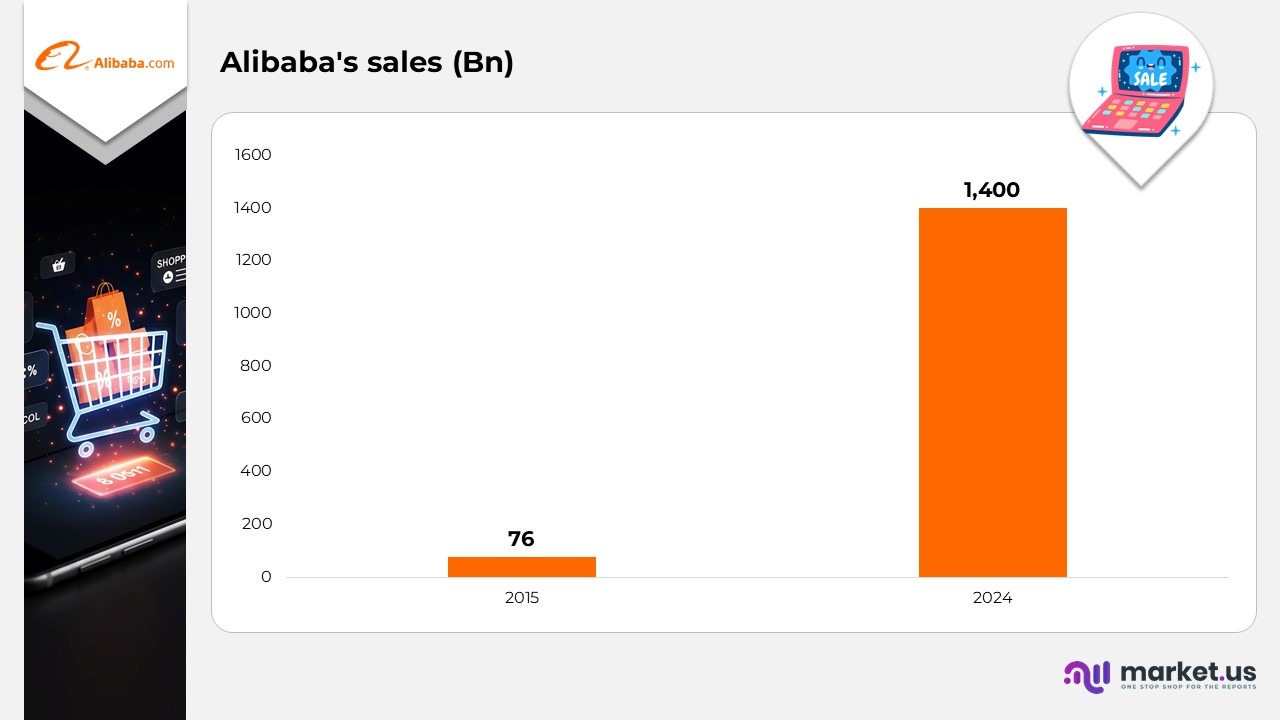
Alibaba Users’ Statistics
- In the initial quarter of 2022, Alibaba is projected to have 1.28 billion active consumers globally.
- In the first quarter of 2022, Alibaba recorded 903 million annual active consumers in China, an increase from 882 million in the previous quarter of 2021.
- In 2020, Alibaba reported having 779 million active customers in China.
- In 2020, Alibaba also had 902 million active mobile users on an annual basis.
- A total of 8.5 million sellers utilise Alibaba’s e-commerce platforms.
- Each month, 785 million individuals engage with Alipay.
Alibaba Revenue Statistics
- In Alibaba’s latest financial year, which ended on March 31, 2024, the company saw a revenue increase of 8.3%, totaling 941.2 billion yuan, or approximately $132.3 billion.
- As per Alibaba Statistics, the most notable increase in the company’s annual revenue occurred in 2018, when it rose by 58.1%, reaching 250.3 billion yuan.
- Recent data shows that in Alibaba’s financial year concluding in March 2024, the company earned 941.2 billion yuan, which is about $132.3 billion, marking a 9.3% rise compared to the previous year.
- Analyzing Alibaba’s annual revenue growth reveals that the company has consistently progressed. In 2013, it reported earnings of 34.5 billion yuan ($4.9 billion). The following year, it grew by 52.1%, reaching 52.5 billion yuan ($7.4 billion).
- In 2015, Alibaba’s annual revenue exceeded the $10 billion mark for the first time, increasing by 32.7% to 76.2 billion yuan. The next year, it continued this upward trend, growing by 32.7% to achieve 101.1 billion yuan ($14.2 billion).
Moreover
- In the second quarter of 2024, Alibaba reported total revenue of approximately 243.24 billion yuan.
- The company operates in various sectors, including e-commerce, cloud computing, digital media and entertainment, innovation projects, and additional services.
- Revenue growth accelerated in 2017, rising by 56.5% to reach 158.3 billion yuan ($22.2 billion). The company maintained robust growth in the subsequent years, and by 2021, its revenue soared to 717.3 billion yuan ($100.8 billion), surpassing the $100 billion mark for the first time.
- In 2022, despite a deceleration in growth to 18.9%, Alibaba’s revenue still amounted to 853.1 billion yuan ($119.9 billion). In 2023, it increased to 868.7 billion yuan ($122.1 billion), albeit at a significantly slower pace of only 1.8%.
- From 2013 to 2024, Alibaba’s annual revenue expanded more than 25-fold, achieving an average annual growth rate of 36.4%. The most significant increase occurred in 2018, with revenue surging by 58.1%.
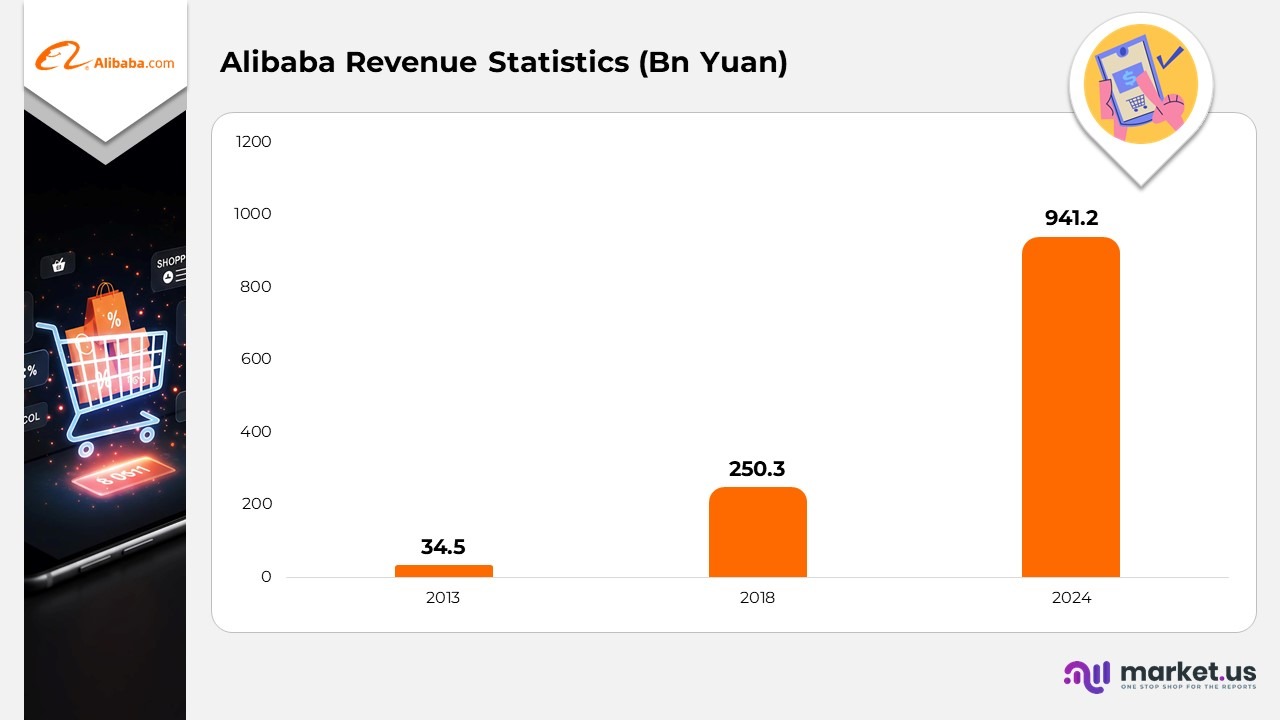
Alibaba E-commerce Platform Statistics
- The majority of Alibaba’s revenue is generated through its e-commerce platforms, Taobao and Tmall.
- In 2023, 46% of Alibaba’s overall revenue was derived from its retail business in China, establishing it as the primary source of income for the organisation.
- Other segments contribute lesser amounts: 11% each is attributed to international e-commerce (including AliExpress and Trendyol), Cainiao logistics services, and cloud computing.
- Smaller fractions are sourced from local consumer services (6%), China commerce wholesale (2%), international commerce wholesale (2%), and digital media and entertainment (2%).
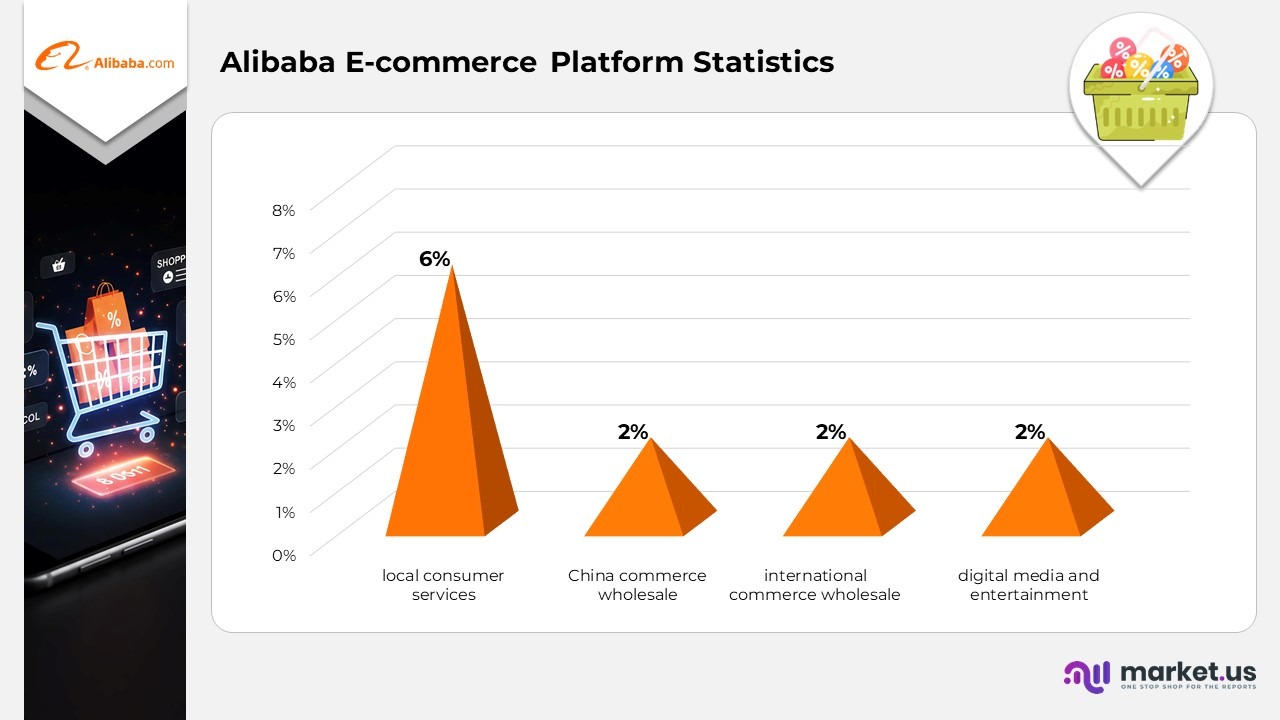
Alibaba Annual E-commerce Revenue
- Alibaba’s statistics indicate that for the fiscal year 2023, which concludes on March 31, 2024, Alibaba Group achieved a revenue of 434.9 billion yuan (approximately US$60.2 billion) from online sales within China.
- For the current year, the group’s total revenue reached 941 billion yuan (around US$130.4 billion). The gross merchandise volume of the Chinese e-commerce sector is projected to be approximately 15.4 trillion yuan in 2023, with growth anticipated to continue.
- Alibaba operates several prominent e-commerce platforms, including Taobao Marketplace and Tmall, as well as cross-border platforms such as AliExpress and Kaola.com.
- Additionally, its portfolio features Alibaba Cloud, which provides cloud computing and data management services, along with the online-to-offline (O2O) fresh food service known as Freshippo.
- Ant Group, previously recognised as Alipay or Ant Financial, was originally a subsidiary of Alibaba but was separated into an independent entity in 2014.
- One of Alibaba’s most significant annual sales events is Singles’ Day, which takes place on November 11. Initially started as a celebration of singlehood, it has evolved into the largest shopping day globally.
- During the Singles’ Day sales in 2021, the gross merchandise volume across Alibaba’s platforms exceeded US$84.5 billion.
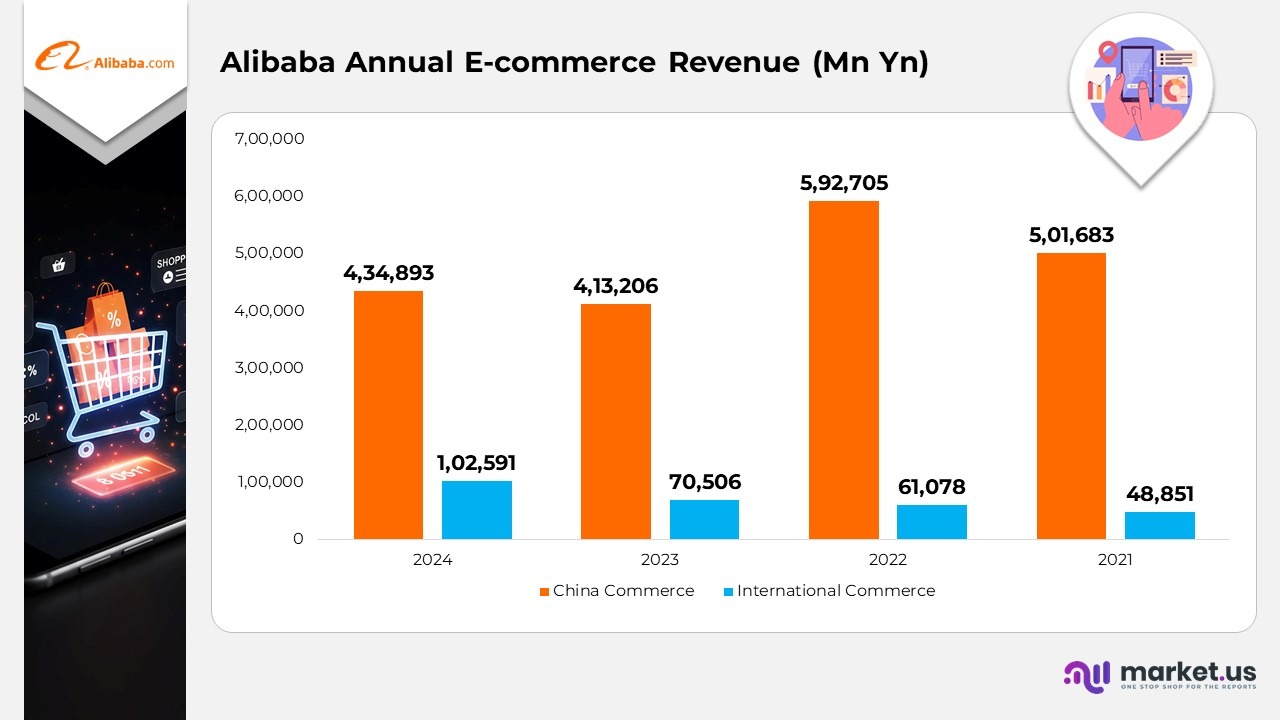
Companies owned by Alibaba
Alibaba Employees Statistics
- As of the end of March 2025, Alibaba Group Holding Limited, the largest e-commerce company in China, had a workforce of 124,320 full-time employees.
- It ranks as the second most valuable publicly traded internet company in China and is among the largest globally in terms of revenue.
- The company made its public debut with a record-breaking IPO of US$25 billion in September 2014. Currently, Alibaba operates on a global scale across e-commerce, retail, internet services, and fintech sectors.
- Renowned for its B2B platform Alibaba.com, the company encompasses various segments including 1688.com and AliExpress.com, in addition to its C2C marketplace Taobao, B2C retail platform Tmall, and online payment service Alipay.
- In January 2020, Alibaba’s workforce exceeded that of Yahoo and Facebook combined, with the majority of employees based in China.
- By 2019, over one-third of its senior management team consisted of women, and nearly 45% of all employees were under the age of 30.
- In 2023, Eddie Wu, a co-founder of Alibaba, succeeded Daniel Zhang as CEO and executive chairman.
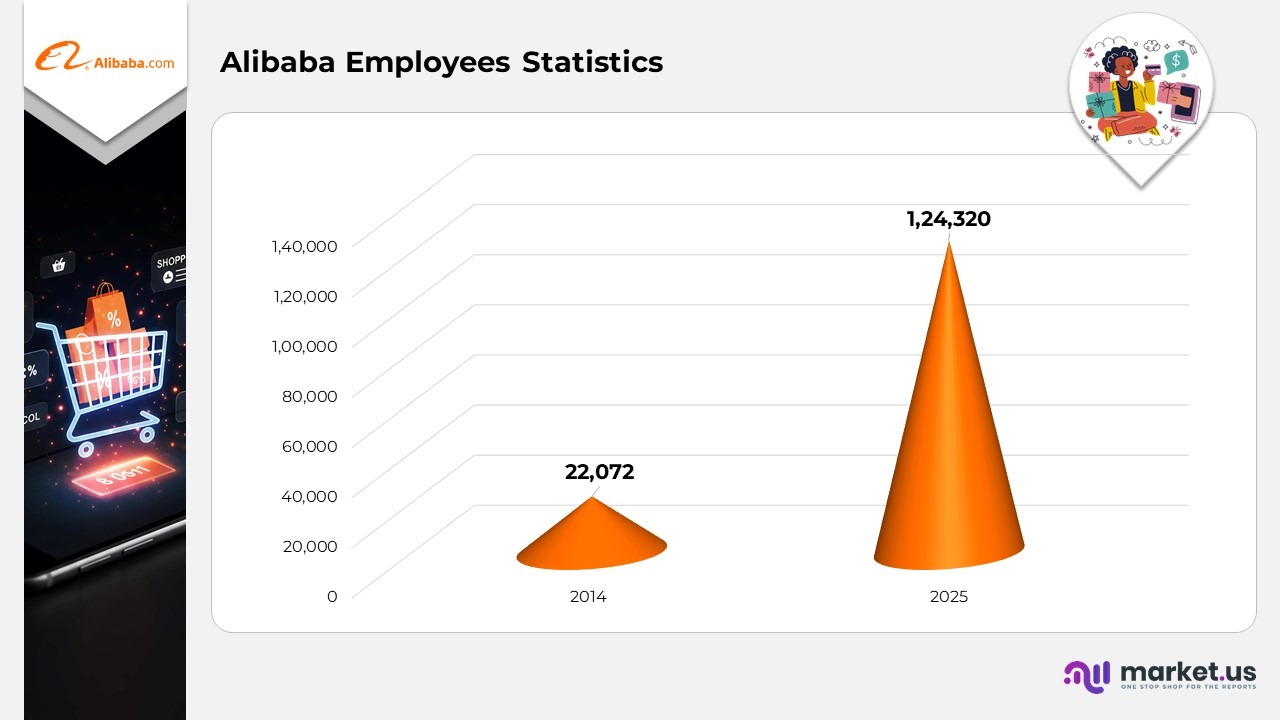
Traffic by Country
- Alibaba’s statistics suggest that this metric is intended to assess the distribution across various countries. It likely pertains to site visitations, market share, or user counts.
- The United States holds 17% of this metric, while China ranks second with 12.39%.
- The remaining three countries, which include Russia (3.45%), the United Kingdom (3.41%), and Canada (3.31%), account for only minor portions.
- The leftover 59.72% will be allocated among a range of other countries collectively, indicating a wide distribution beyond the top five nations.
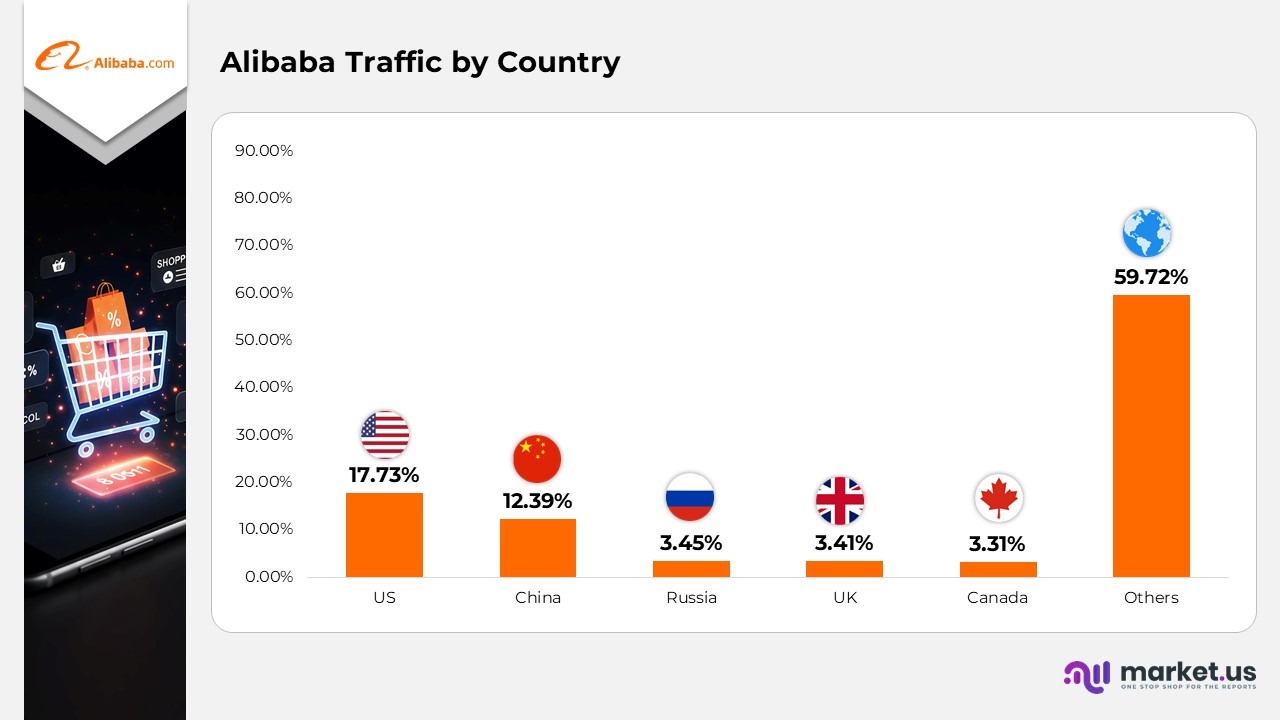
Alibaba Demographics Statistics
- 12% of the traffic to Alibaba’s website from desktop users originates in the United States.
- 75% of the desktop traffic to Alibaba’s website is sourced from China.
- 04% of the desktop traffic to AliExpress’s website comes from Brazil.
- Additionally, 8.20% of AliExpress’s website traffic is from the United States, while 7.49% is from Spain.
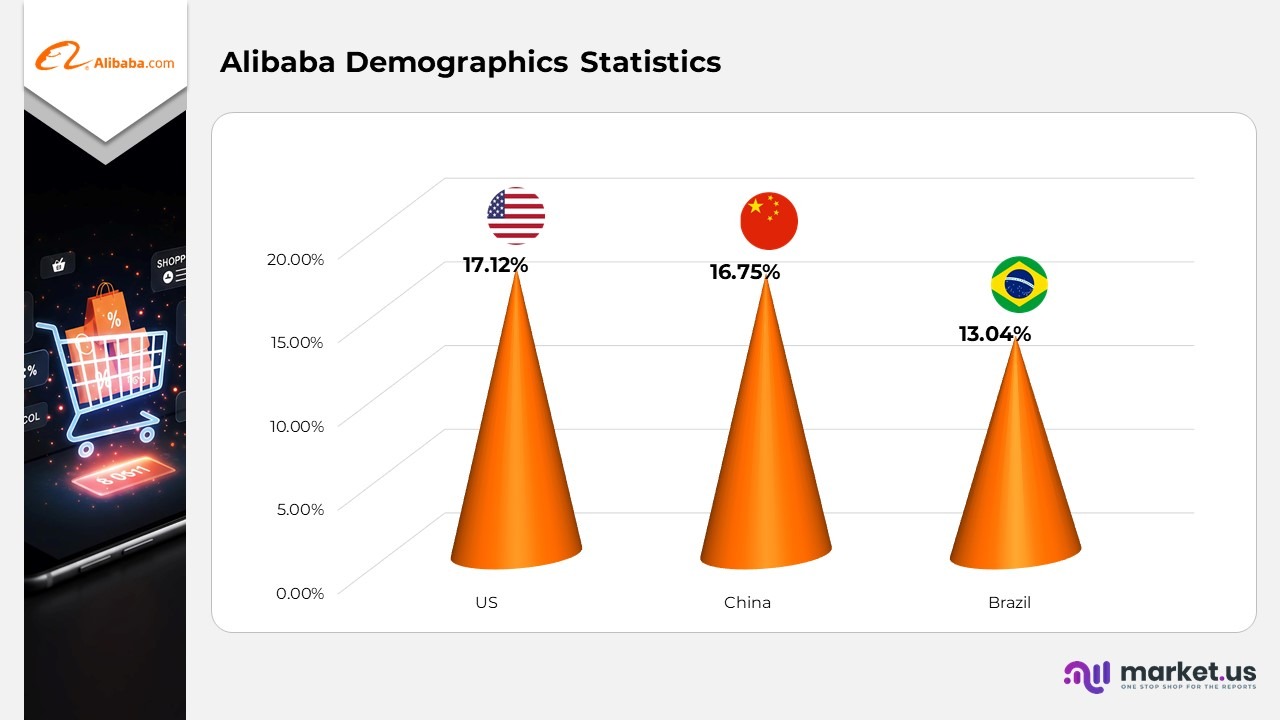
Fun Facts of Alibaba
- Jack Ma successfully persuaded Joe Tsai to resign from his $700,000 position in Hong Kong to join Alibaba for an annual salary of $600.
- SoftBank made its initial investment in Alibaba, amounting to $20 million, after Jack Ma established a rapport with its CEO, Masayoshi Son, in 2000, despite lacking a business plan and generating no revenue.
- Taobao was a covert initiative launched by Jack Ma in 2002 to compete with eBay China.
- Alipay was founded in 2004 to streamline transactions between buyers and sellers.
- In 2011, Alipay was sold to Jack Ma without the awareness of either SoftBank or Yahoo.
- In 2007, Alibaba went public with its B2B platform, Alibaba.com, in Hong Kong, offering shares at a price of HK$13.50.
- Microsoft came close to becoming a significant stakeholder in Alibaba after it proposed a $45 billion acquisition of Yahoo in an effort to compete with Google in the search engine market.
Recent Developments
- Alibaba is making substantial investments in artificial intelligence (AI), with CEO Eddie Wu declaring that the attainment of artificial general intelligence (AGI) is the foremost objective of the company. Recent advancements encompass the launch of sophisticated models like Qwen3, enhancements to its AI infrastructure, and strategic collaborations, including a partnership with Nvidia to promote “Physical AI”.
Alibaba Future Predictions
- By the end of the year 2025, Alibaba is anticipated to emerge as a significant contender in China’s e-commerce sector, with online retail sales in the nation projected to hit $3.6 trillion.
- Retail sales in China are predicted to increase by 44.6%, further facilitating Alibaba’s expansion. The organisation aims to achieve a customer base of 2 billion globally by 2036.
Conclusion
According to Alibaba’s statistics, the fiscal year 2024 was significant in Alibaba’s transformation, marked primarily by strategic repositioning and the consolidation of its core business sectors. In spite of various challenges within the domestic market, Alibaba’s emphasis on user experience and artificial intelligence provides a solid foundation for future growth. With a strong financial framework and a well-defined strategy, Alibaba is well-equipped to navigate the continuously changing global market environment. As it progresses, Alibaba is expected to maintain its position as a leading force in e-commerce, technology, and logistics on a global scale. This article has provided ample insight into Alibaba’s statistics.


